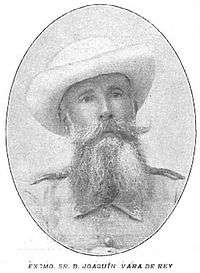Joaquín Vara de Rey y Rubio
Joaquín Vara de Rey y Rubio (14 August 1841 – 1 July 1898) was a career Spanish military officer. He is best known for leading the stubborn defense of El Caney against a massively superior American force during the Spanish–American War.
Joaquín Vara de Rey y Rubio | |
|---|---|
 | |
| Born | 14 August 1841 Ibiza, Spain |
| Died | 1 July 1898 (aged 56) El Caney, Cuba |
| Allegiance | |
| Service/ | Spanish Army |
| Years of service | 1862–1898 |
| Rank | Brigadier General |
| Battles/wars |
|
| Awards | |
Military career
Vara de Rey was born on the island of Ibiza in the Balearic Islands on 14 August 1841.[1] He graduated as a second lieutenant from the Colegio General, rising to the rank of first lieutenant in 1862. He fought against uprisings in Cartagena and Valencia and against the Carlists in the Carlist Wars. He requested a transfer to the Philippines in 1884 and remained there until 1890, serving as military political governor of the Mariana Islands and then of Zamboanga. In 1891 he was promoted to colonel and returned to Spain.
In 1895, Vara de Rey volunteered for service in Cuba. He commanded the Spanish forces at Bayamo and led his regiment to victory at the Battle of Loma de Gato in which the Spaniards killed revolutionary leader José Maceo, brother of Antonio Maceo Grajales.
On 1 July 1898, during the Spanish-American War, Vara de Rey, by then a brigadier general, with only 550 men and two 80-millimeter mountain guns under his command, heroically defended Battle of El Caney for ten hours against a United States Army Second Division under Brigadier General Henry Ware Lawton and an Independent Brigade, a total of more than 8,000 men. Vara de Rey lost two sons in the battle and was himself mortally wounded in the fighting; only 84 Spanish soldiers survived unscathed. His well-placed defenses centered around small, covered bunkers situated for mutual protection so that an enemy attack on an individual bunker would draw supporting fire from several others.
Impressed by his generalship, U.S. troops buried Vara de Rey with full military honors. American accounts of the campaign praised the "magnificent courage" of Vara de Rey's soldiers and described the man as "an incomparable leader; a heroic soul."[2] Vara de Rey's remains were repatriated to Spain in November 1898 with American cooperation. He was posthumously awarded the Laureate Cross of Saint Ferdinand, Spain's highest military decoration.
Notes
References
- Albert A. Nofi (1997). The Spanish–American War, 1898. Combined Books. ISBN 0-938289-57-8.